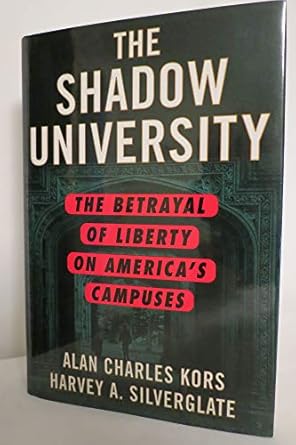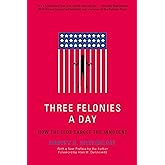Buy new:
-10% $24.88$24.88
Ships from: Orion LLC Sold by: Orion LLC
Save with Used - Good
$7.49$7.49
Ships from: Amazon Sold by: Books Today For You

Download the free Kindle app and start reading Kindle books instantly on your smartphone, tablet, or computer - no Kindle device required.
Read instantly on your browser with Kindle for Web.
Using your mobile phone camera - scan the code below and download the Kindle app.

Follow the authors
OK
The SHADOW UNIVERSITY: The Betrayal of Liberty on America's Campuses Hardcover – October 2, 1998
Purchase options and add-ons
- Print length432 pages
- LanguageEnglish
- PublisherFree Press
- Publication dateOctober 2, 1998
- Dimensions6.5 x 1.25 x 9.5 inches
- ISBN-109780684853215
- ISBN-13978-0684853215
Book recommendations, author interviews, editors' picks, and more. Read it now
Customers who viewed this item also viewed
Editorial Reviews
Amazon.com Review
From Publishers Weekly
Copyright 1998 Reed Business Information, Inc.
From Library Journal
Copyright 1998 Reed Business Information, Inc.
From Booklist
From Kirkus Reviews
Review
The abuses they describe need fixing, and this cogent book should help. -- The New York Times Book Review, Sam Tanenhaus
About the Author
Product details
- ASIN : 0684853213
- Publisher : Free Press (October 2, 1998)
- Language : English
- Hardcover : 432 pages
- ISBN-10 : 9780684853215
- ISBN-13 : 978-0684853215
- Item Weight : 1.54 pounds
- Dimensions : 6.5 x 1.25 x 9.5 inches
- Best Sellers Rank: #2,312,392 in Books (See Top 100 in Books)
- #1,239 in Civil Rights & Liberties (Books)
- #2,112 in Political Conservatism & Liberalism
- #17,653 in Higher & Continuing Education
- Customer Reviews:
About the authors

Discover more of the author’s books, see similar authors, read book recommendations and more.

Discover more of the author’s books, see similar authors, read book recommendations and more.
Customer reviews
Customer Reviews, including Product Star Ratings help customers to learn more about the product and decide whether it is the right product for them.
To calculate the overall star rating and percentage breakdown by star, we don’t use a simple average. Instead, our system considers things like how recent a review is and if the reviewer bought the item on Amazon. It also analyzed reviews to verify trustworthiness.
Learn more how customers reviews work on AmazonCustomers say
Customers appreciate the book's historical content, with one review highlighting its thorough documentation of legal issues and another noting its collection of case studies. Customers find the book well worth reading, with one customer specifically recommending it as required reading for college students.
AI-generated from the text of customer reviews
Select to learn more
Customers appreciate the book's historical content, with one customer highlighting its thorough documentation of legal issues and another noting its collection of case studies.
"...It also provides a thorough history of the underlying legal issues that support constitutional rights to freedom of speech, conscience, and due..." Read more
"Kors and Silverglate have written a powerful, well-documented indictment of the regime of political correctness that currently dominates academic..." Read more
"...The book has many cited examples and details pervasive bigotry on campus. It's time that honest citizens did something about it...." Read more
"This book is a collection of case studies regarding an organization called FIRE, the Foundation for Individual Rights in Education...." Read more
Customers find the book well worth reading, with one mentioning it should be required reading for every college student.
"...It is well worth the read, and ought to be required reading for every college student, employee, and regent." Read more
"a great book when it comes to content. this author is surely an expert on the societal decay of the american university system...." Read more
"Interesting Read...." Read more
"Most eye-opening book I've read in ages..." Read more
Top reviews from the United States
There was a problem filtering reviews. Please reload the page.
- Reviewed in the United States on August 17, 2012This eye-opening and deeply learned exposé of the violations of individual rights on campuses is now more than 10 years old. Fortunately, the authors created a foundation (FIRE: The Foundation for Individual Rights in Education) to advance the cause of free speech and individual rights on the nation's campuses. A visit to the FIRE website reveals that the kinds of problems that prompted "The Shadow University" still plague our institutions of higher education. Although the book's emphasis is on free speech, both it and FIRE demonstrate how freedom of conscience and religion, the right to due process, and inalienable rights of free expression are linked together.
Despite its age, "The Shadow University" still remains an excellent place to begin understanding these issues. Not only does the book detail the "celebrated causes" of its moment in time, which now in 2012 seem a little dated (especially as it rests so much on the water buffalo case at Penn, now coming on 20 years old). It also provides a thorough history of the underlying legal issues that support constitutional rights to freedom of speech, conscience, and due process protections. While Kors and Silverglate (an educator and a lawyer) provide eloquent and ringing defenses of basic human rights and freedoms, they are also quite savvy about how institutions work--and know that such endorsements, however inspiring (and they are), will not change how institutions work without political pressure.
At one point, they write that the "high-handedness demonstrated by private college administrators often betrays an exaggerated sense of legal invulnerability," a claim that is clearly false. Their own analysis shows, rather, that college administrators are slaves to lawyers and trustees preoccupied with risk management and protecting their schools' reputations: "The primary goal of modern academic administrators is to buy peace during their tenure and to preserve the appearance of competence on their watch...." Given this reality, those who care about individual rights on campus must borrow a page from their opponents (those willing to trample rights in order to achieve certain political goals) and make the lives of institutions very uncomfortable when they abridge essential individual rights. "The Shadow University" and FIRE do just this--and have been successful at publicizing violations.
Those who would ignore individual rights, however, proceed apace. Witness the "Dear Colleague" letter of April, 2011, in which the Office of Civil Rights required all institutions of higher learning to reduce their standard for evidence for adjudicating sexual harassment claims (including rape) to a mere preponderance of the evidence. FIRE has protested this letter vigorously, but colleges and universities are in the process of rearranging their grievance procedures and guidelines to comply with this outrageous demand for fear of losing federal funding, which would be a devastating outcome for any school.
Such escalation of the infringement of due process and individual rights makes me long for a revised version or new edition of "The Shadow University." These are problems about which no freedom-loving person can afford to feel complacent. Students and faculty in today's universities are still deeply confused about the reach and importance of freedom of speech, often imagining that one person's right not to be offended trumps another person's right to think and speak freely. It would be good to have a new version of "The Shadow University" that reflects the particular issues we face in the twenty-first century (e.g., changing definitions of sex and gender, social media, in addition to the steady erosion of respect for personal integrity that is represented in the "Dear Colleague" letter). Such a new edition could serve as a rallying cry today in the way that this classic study did for students and faculty of the 90s.
- Reviewed in the United States on June 29, 2002Kors and Silverglate have written a powerful, well-documented indictment of the regime of political correctness that currently dominates academic life. Their book makes the following key points:
1. In the last few decades, colleges and universities across America have established speech codes which curtail freedom of speech. They have administered these codes using judicial procedures which do not meet minimal standards of justice. And they have set up student life programs that are designed to indoctrinate students into a particular mode of thought. The authors present pages and pages and pages of examples of all of these facts, with thorough documentation. The problem may not exist on all campuses, but it clearly exists on a lot of them.
2. They offer a good historical account of the philosophical developments that gave rise to the PC movement. In doing so, they lay bear the non-democratic foundations of this movement; which is important because proponents of political correctness frequently cloak their positions behind democratic-sounding rhetoric.
3. Kors and Silverglate lay open the double-standards of the PC movement. The movement preaches tolerance, but is itself extremely intolerant of certain points of view. The rhetoric of tolerance has been used to mask what is, in fact, a nakedly political bid for a shift in power towards those on the "liberal" side of the political spectrum. Once the rhetoric is "deconstructed", we will be able to return to a more honest discourse about these issues.
4. The authors also touch on the insidious nature of affirmative action and the PC movement with respect to the very people these programs are supposed to support. The PC movement creates a climate in which it becomes impossible to NOT categorize people by race, gender or sexual preference. For all their complaints about stereotyping, proponents of political correctness force individuals to identify themselves by their "labels" rather than to seek out their own identities.
The Shadow University offers a powerful plea to defend the freedoms of thought and speech that are so vital to a diverse democratic society. It is a call that should be respected by all, regardless of their political persuasion. Professor Kors recently wrote an opinion for the magazine First Things, in which he defends Catholic higher education using these very principles. What is remarkable about his stance, is that he is not a Catholic, and one suspects that he has strong differences with the Catholic view. This is a man who practices what he preaches.
I gave this book 4 stars, and not 5 -- but mostly due to minor difficulties. The book is a bit of a slog. For several pages, it seems as though one is reading the details of every speech code on every campus. Statistics do have the virtue of summarizing a vast quantity of data into a digestable form -- and this book doesn't avail itself of that. There's a great deal of legal minutiae that only a lawyer could love. And finally, the paperback edition is printed with a rather small typeset, which is difficult for those of us who are ophthalmologically-challenged.
But those are quibbles. This is an important book on a topic that should concern every American citizen.
- Reviewed in the United States on September 13, 2003The Shadow University shows just how bad racist and sexist censorship and mind control has become on American university campuses. Cleverly disguised as "harassment policy" virtually every college and university in the US not categorically prohibits free speech, free ideas, or free thinking whenever it disagrees with the officially sanctioned racism and sexism. The book has many cited examples and details pervasive bigotry on campus. It's time that honest citizens did something about it. The author is an officer of the Foundation for Individual Rights in Education, Inc. (FIRE) They are currently suing several universities and winning lawsuits where judges are required to explain to university paid bigots (college presidents) the facts of constitutional law. It is well worth the read, and ought to be required reading for every college student, employee, and regent.
- Reviewed in the United States on November 10, 2006This book will make you angry. If it doesn't, then you did not READ it. Many of the examples in the book made me rethink how the college life is. Too often, Americans look at the universities as places of open and honest debate about ideas regarding society and then we are disappointed when we see that academia is stifling and punishing free expression.
Speech codes and suppression of politically incorrect ideas are shown throughout the book as harmful not only to the education process, but to American ideals as well.
This is an excellent expose' indicting the so-called tolerant universities as the most intolerant of them all. Whatever happened to freedom of expression? You can't say that on college campuses in the US anymore.









